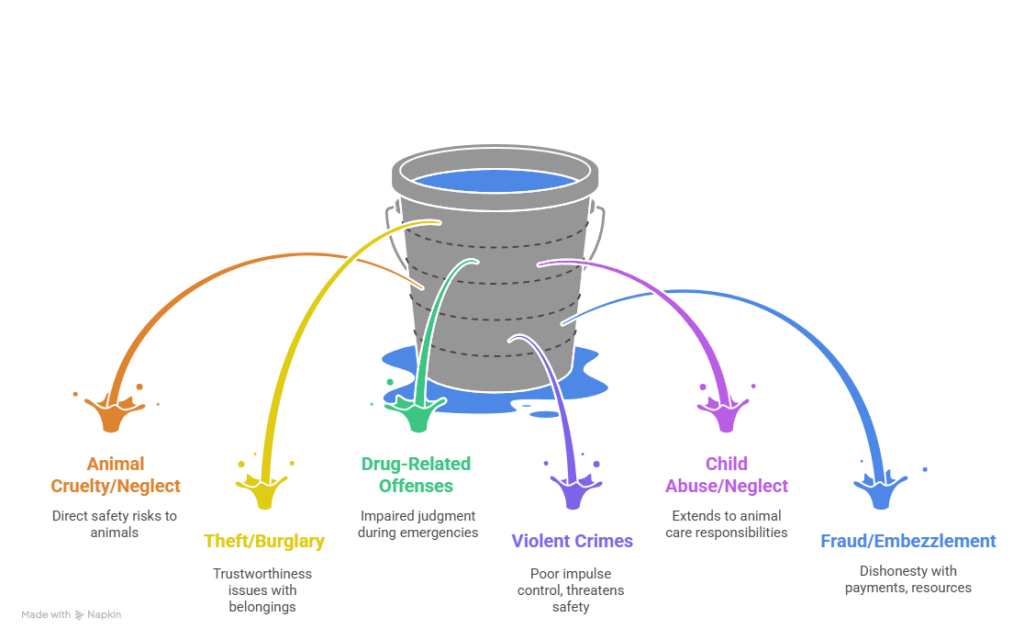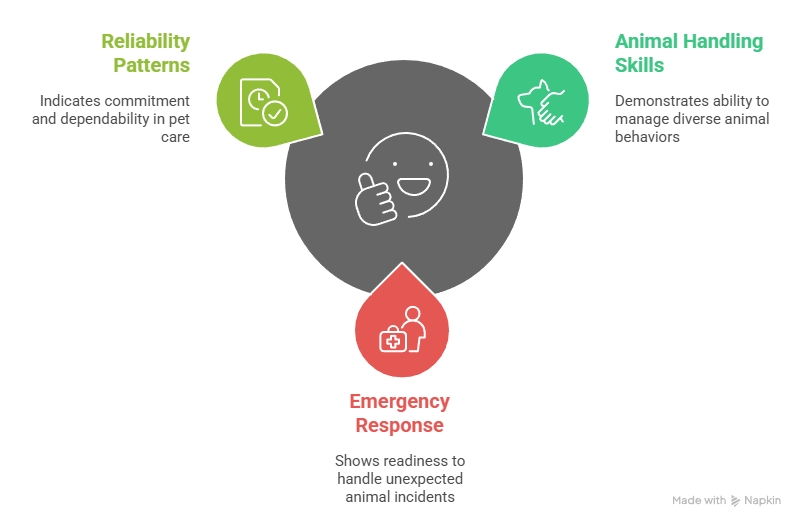Pet daycare facilities require comprehensive employee screening protocols that go beyond standard background checks to include animal-specific qualifications and temperament assessments. Proper screening reduces liability risks by up to 80% while ensuring the safety of both animals and staff in high-stress, multi-pet environments.
Key Takeaways
- Legal Protection: Proper pet daycare employee screening reduces facility liability and protects against negligence lawsuits that can reach hundreds of thousands of dollars.
- Multi-Component Process: Effective screening includes criminal background checks, reference verification, animal handling experience validation, and behavioral assessments.
- Industry-Specific Requirements: Pet care facilities must screen for animal cruelty history, drug-related offenses, and theft convictions that standard employment screening might overlook.
- Ongoing Monitoring: Continuous background monitoring and annual re-screening help maintain staff quality and identify issues that develop after initial hiring.
- Compliance Standards: FCRA compliance and state-specific employment laws govern the screening process, requiring proper disclosure and candidate consent procedures.
- ROI Benefits: Investment in thorough screening pays dividends through reduced turnover, improved insurance rates, and enhanced customer trust and retention.
A pet daycare in Denver faced a $200,000 lawsuit when an unscreened employee's negligence led to a dog fight resulting in serious injuries to multiple animals. This scenario highlights the critical importance of comprehensive employee screening in animal care facilities. A single hiring mistake can result in devastating financial and reputational consequences.
The pet daycare industry has experienced remarkable growth, expanding at 8.7% annually as more pet owners seek professional care for their beloved animals. This growth creates both opportunities and challenges for facility owners. They must balance rapid hiring needs with thorough vetting processes. Unlike traditional childcare or retail environments, pet daycare facilities present unique screening requirements. These stem from the unpredictable nature of animal behavior and the specialized skills needed to manage multiple pets safely.
Pet daycare employee screening encompasses far more than standard background checks. Successful facilities implement multi-layered screening processes that evaluate criminal history, verify animal handling experience, and assess temperament compatibility. Additionally, they ensure ongoing compliance with industry standards. This comprehensive approach protects facilities from liability while creating safer environments for both animals and staff members.
Understanding Pet Daycare Screening Requirements
Pet daycare facilities operate in a unique regulatory environment where standard employment screening practices must be enhanced to address animal-specific risks and requirements. The screening process for pet care professionals requires careful attention to both traditional employment factors and specialized considerations related to animal welfare and safety. Modern pet daycare employee screening protocols have evolved to address the complex liability landscape facing animal care businesses in 2025.
The foundation of effective screening begins with understanding the specific risks associated with pet daycare operations. Unlike other service industries, pet daycares face exposure to animal bite incidents, property damage from inadequate supervision, and potential animal cruelty allegations. These risks necessitate screening criteria that evaluate candidates' ability to remain calm under pressure, recognize animal behavioral cues, and respond appropriately to emergency situations involving aggressive or distressed animals. The multi-pet environment creates additional complications that require specialized assessment approaches. Staff members must demonstrate competency in managing pack dynamics, preventing resource guarding conflicts, and maintaining individual animal safety within group settings.
Legal Framework and Compliance Standards
Pet daycare facilities must navigate complex legal requirements when implementing employee screening programs, with FCRA compliance serving as the foundation for all background check activities. Proper legal compliance protects facilities from discrimination lawsuits while ensuring thorough candidate evaluation within acceptable legal boundaries. The 2025 regulatory landscape includes updated guidance on artificial intelligence usage in hiring decisions and expanded protections for candidates with criminal histories.
| FCRA Requirement | Timeline | Documentation Needed |
| Pre-screening disclosure | Before background check | Written consent form |
| Adverse action notification | 3-5 business days | Pre-adverse action letter |
| Final adverse action | After candidate response period | Final adverse action notice |
| Record retention | 1 year minimum | All screening documentation |
| Candidate dispute process | 30 days for investigation | Dispute resolution records |
State-specific employment laws add additional layers of complexity to pet daycare employee screening processes. Recent legislative updates in several states have expanded fair chance hiring requirements that affect how facilities can utilize criminal background information in hiring decisions.
Criminal Background Check Priorities
Criminal background screening for pet daycare employees requires targeted focus on specific offense categories that pose the greatest risk to animal welfare and facility operations. Standard background checks often overlook nuanced criminal history elements that are particularly relevant to animal care environments. Pet daycare employee screening protocols must prioritize certain offense types while maintaining fair hiring practices and legal compliance throughout the evaluation process.
High-Priority Offense Categories:

- Animal Cruelty/Neglect: Any conviction or pending charges related to animal mistreatment warrant immediate disqualification due to direct safety risks.
- Theft/Burglary: Property crimes indicate trustworthiness issues around valuable pet accessories and customer belongings.
- Drug-Related Offenses: Substance abuse issues could impair judgment during animal emergencies requiring split-second decision-making.
- Violent Crimes: Assault, domestic violence, or other indicators reveal poor impulse control that threatens animal safety.
- Child Abuse/Neglect: Patterns of dependent care violations may extend to animal care responsibilities and supervision duties.
- Fraud/Embezzlement: Financial crimes indicate dishonesty with customer payments or facility resources and inventory management.
The screening process should also consider the recency and severity of offenses, allowing for redemptive hiring practices where appropriate. Professional screening services specializing in pet care employment can provide enhanced search capabilities that identify animal-related offenses across multiple jurisdictions and database sources.
Multi-Jurisdiction Search Strategies
Comprehensive criminal screening requires searches across multiple jurisdictions and timeframes to capture relevant offense history that might impact pet daycare employment suitability. Many candidates have lived in multiple states or counties, creating gaps in standard single-jurisdiction background checks that could miss critical criminal history information. The screening process must account for candidate mobility while balancing thoroughness with cost-effectiveness and legal compliance requirements. Professional screening services can provide county-level searches covering 7-year criminal history in all counties of residence and employment, statewide criminal database searches for broader offense identification, federal database screening including OFAC and terrorist watch lists, and municipal citation reviews for animal control violations and local ordinance violations.
Reference Verification and Experience Validation
Reference verification for pet daycare positions requires specialized approaches that go beyond standard employment confirmation to evaluate animal handling competency and workplace behavior patterns. Traditional reference checks often fail to uncover critical information about candidates' ability to manage stressed animals or maintain safety protocols during high-intensity situations. Pet daycare employee screening must incorporate targeted reference interviews that assess animal-specific skills and temperament compatibility with facility operations.
Reference Interview Focus Areas:

- Animal Handling Skills: Former supervisors should provide specific examples of how candidates managed difficult or aggressive animals in previous positions. These examples reveal natural aptitude and learned techniques that predict future performance in challenging situations. References should describe the candidate's comfort level with different animal sizes and temperaments.
- Emergency Response: References must detail how candidates handled animal injuries, fights, or medical emergencies that required immediate intervention. Quick thinking and appropriate response protocols demonstrate readiness for daycare environments where emergencies occur unpredictably. Previous employers can verify whether candidates followed proper emergency procedures and maintained composure under pressure.
- Reliability Patterns: Attendance, punctuality, and follow-through on pet care responsibilities indicate professional commitment and dependability. References should address any attendance issues or instances where candidates failed to complete assigned animal care duties. Consistent reliability becomes critical when animal welfare depends on staff presence and attention.
Documentation of reference conversations protects facilities from potential employment liability while creating records that support hiring decisions. Structured reference interview forms ensure consistency across candidates and help identify patterns that might indicate future performance issues or exceptional qualifications.
Experience Authentication Methods
Validating claimed pet care experience requires verification strategies that confirm both the scope and quality of candidates' animal handling background. Resume fraud is common in the rapidly growing pet care industry, with many candidates exaggerating their experience levels or failing to disclose negative incidents from previous positions. The verification process must balance thoroughness with practical constraints while identifying candidates who misrepresent their qualifications.
Employment verification in the pet care industry faces unique challenges due to the prevalence of small businesses, individual pet owners as employers, and informal work arrangements. Professional networks within the local pet care community often provide informal reference information that supplements official verification processes. Direct employer contact through phone verification with previous pet care employers or veterinary offices remains the most reliable method, supplemented by certification verification, skill demonstration assessments, and portfolio reviews of training certificates and professional development records.
Skills Assessment and Temperament Evaluation
Pet daycare environments demand specific personality traits and behavioral characteristics that cannot be adequately assessed through traditional interview processes or background checks alone. Temperament evaluation represents a critical component of pet daycare employee screening, as employees must remain calm under pressure, demonstrate patience with both animals and owners, and maintain situational awareness in chaotic multi-pet environments. Effective assessment protocols evaluate candidates' natural responses to animal behavior and stress-inducing situations that commonly occur in daycare settings, including their ability to read animal body language, respond to aggressive behavior, and maintain safety protocols while managing multiple pets simultaneously. The assessment process must account for different skill levels and experience backgrounds while identifying candidates with the foundational abilities necessary for safe animal care, including stress response evaluation, communication skills, physical capabilities for restraining large dogs, attention to detail for recognizing illness symptoms, decision-making abilities regarding emergency protocols, and learning adaptability for absorbing training information and modifying behavior based on feedback.
Behavioral Assessment Techniques
Structured behavioral assessment protocols provide objective evaluation criteria that support fair hiring decisions while identifying candidates best suited for pet daycare environments. These assessments focus on observable behaviors and measurable responses rather than subjective impressions that may introduce bias into the selection process. Professional assessment tools designed specifically for animal care employment can provide standardized evaluation criteria that ensure consistency across all candidates.
| Assessment Method | Focus Area | Evaluation Criteria |
| Scenario-Based Testing | Emergency Response | Reaction time and protocol adherence |
| Role-Playing Exercises | Customer Relations | Communication clarity and conflict resolution |
| Physical Competency | Animal Handling | Safe restraint techniques and injury prevention |
| Group Dynamics | Team Collaboration | Leadership skills and stress management |
| Problem-Solving | Critical Thinking | Decision quality under time pressure |
Behavioral assessment techniques help predict job performance by evaluating how candidates respond to realistic workplace scenarios and challenges. These structured approaches provide documented justification for hiring decisions while meeting legal requirements for non-discriminatory employment practices.
Ongoing Monitoring and Re-Screening Protocols
Continuous employee monitoring and periodic re-screening represent essential components of comprehensive pet daycare employee screening programs. Initial background checks provide only a snapshot of candidate history at the time of hire, while employee behavior patterns, personal circumstances, and criminal history can change significantly after employment begins. Modern screening programs incorporate ongoing monitoring technologies that alert employers to new arrests, convictions, or other relevant developments that may impact job performance or animal safety.
Monitoring Program Elements:
- Criminal record updates through quarterly database searches
- Performance trend analysis tracking incident reports and complaints
- Certification maintenance for required training renewals
- Reference check updates identifying developing concerns
- Social media monitoring for reputation management
- Insurance claim reviews analyzing liability patterns
- Customer feedback analysis for employee-specific issues
- Peer evaluation systems ensuring safety compliance
Documentation of ongoing monitoring activities demonstrates due diligence that can provide legal protection in the event of employee-related incidents. Professional background monitoring services can provide continuous surveillance while generating alerts for new developments that require management attention and potential intervention.
Performance Tracking Systems
Effective monitoring systems track multiple performance indicators that correlate with increased risk in pet daycare environments. These systems help identify patterns that might indicate developing problems before serious incidents occur. Technology integration streamlines the monitoring process while maintaining comprehensive documentation for regulatory compliance and liability protection.
Key Performance Indicators:
- Attendance Patterns: Frequent absences or tardiness may indicate personal problems affecting job commitment and animal care quality.
- Incident Reports: Increasing frequency of animal injuries or behavioral problems suggests declining performance or attention to safety protocols.
- Customer Complaints: Rising complaints about specific employees indicate potential issues with animal handling or customer service quality.
- Training Compliance: Failure to complete required continuing education may signal disengagement from professional development expectations.
- Peer Feedback: Negative reports from coworkers often reveal problems with teamwork or safety protocol adherence.
Automated monitoring systems eliminate administrative burden while ensuring consistent oversight across all facility employees. Regular review of these indicators allows management to intervene with additional training, counseling, or corrective action before problems escalate to serious incidents.
Conclusion
Comprehensive pet daycare employee screening represents a critical investment in facility safety, liability protection, and long-term business success. The multi-layered approach combining criminal background checks, reference verification, skills assessment, and ongoing monitoring creates a robust hiring framework that identifies qualified candidates while filtering out individuals who pose risks to animal welfare. Facilities that implement thorough screening protocols demonstrate their commitment to professional standards while protecting themselves from the significant financial and reputational consequences of negligent hiring. As the pet care industry continues expanding in 2025, screening excellence will increasingly differentiate successful facilities from those struggling with safety incidents and liability exposures.
Frequently Asked Questions
What specific criminal offenses should automatically disqualify pet daycare candidates?
Animal cruelty convictions, violent felonies, and drug-related offenses within the past seven years typically warrant automatic disqualification due to direct safety risks. However, facilities should consult employment attorneys to ensure compliance with local fair chance hiring laws that may limit how criminal history can be used in hiring decisions.
How often should existing employees be re-screened for criminal background updates?
Annual re-screening is recommended for all animal care positions, with quarterly monitoring for employees in supervisory roles or those with access to controlled substances. Continuous monitoring services can provide real-time alerts for new criminal charges without requiring manual re-screening processes.
Are there specific certifications or training programs that enhance candidate screening?
Pet CPR/First Aid certification, professional dog training credentials, and veterinary assistant programs demonstrate serious commitment to animal care. However, practical skills assessment remains essential, as certifications don't guarantee appropriate temperament or hands-on competency with stressed or aggressive animals.
What reference verification methods work best for candidates without formal pet care employment history?
Contact veterinarians for personal pet care history, volunteer coordinators at animal shelters, and neighbors or friends who can speak to the candidate's interactions with animals. Social references often provide valuable insights into animal rapport and responsible pet ownership behaviors.
How can facilities balance thorough screening with urgent staffing needs during busy periods?
Implement expedited screening protocols for temporary or seasonal positions while maintaining full screening requirements for permanent hires. Partner with staffing agencies that pre-screen candidates according to your specifications, and maintain a pool of previously screened candidates who can be called for emergency coverage.
What legal protections does comprehensive screening provide against liability claims?
Thorough screening demonstrates reasonable care in hiring decisions, which can reduce liability exposure and support defense against negligent hiring claims. However, screening doesn't eliminate all risks, and facilities should maintain comprehensive liability insurance regardless of screening thoroughness.
Additional Resources
- Fair Credit Reporting Act Compliance Guide for Employers
https://www.ftc.gov/business-guidance/resources/using-consumer-reports-what-employers-need-know - National Association of Professional Pet Sitters Screening Guidelines
https://www.petsitters.org/page/ScreeningGuidelines - Pet Care Services Association Employment Best Practices
https://www.petcareservices.org/page/EmploymentBestPractices - State-by-State Fair Chance Hiring Law Directory
https://www.nelp.org/publication/ban-the-box-fair-chance-hiring-state-and-local-guide/ - Animal Care Facility Insurance Requirements by State
https://www.naic.org/cipr_topics/topic_pet_insurance.htm

GCheck Editorial Team
Meet the GCheck Editorial Team, your trusted source for insightful and up-to-date information in the world of employment background checks. Committed to delivering the latest trends, best practices, and industry insights, our team is dedicated to keeping you informed.
With a passion for ensuring accuracy, compliance, and efficiency in background screening, we are your go-to experts in the field. Stay tuned for our comprehensive articles, guides, and analysis, designed to empower businesses and individuals with the knowledge they need to make informed decisions.
At GCheck, we're here to guide you through the complexities of background checks, every step of the way.





